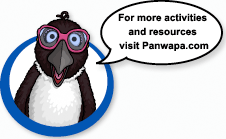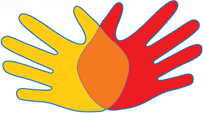 |
Welcome parents and teachers!
Panwapa, created by the educational experts behind Sesame Street and in partnership with the Merrill Lynch Foundation, is a non-commercial, multimedia, global initiative designed to inspire and empower a new generation of children to become responsible global citizens. |
|
|
Educational Objectives
Children today are growing up in an increasingly globally-connected society. While globalization is bringing individuals across the world closer together, offering tremendous opportunities and change, it is also requiring children to develop skills, perspectives and competencies to understand and navigate an interconnected world. Although the need exists to nurture young children by establishing the foundation for global citizenship early in their development, there are few resources or international efforts providing young children the basis for these lifelong perspectives and competencies that will meet the demands of the world of tomorrow, today.
In response to this need, Sesame Workshop has created an educational framework for developing media material designed to help children gain the values, attitudes and skills they need to learn and grow in today's world. The framework has at its core five basic competencies that educators have identified as the cornerstone to the development of good global citizenship |
| The goals of Panwapa are: |
| 1) |
Awareness of a Wider World |
 |
| 2) |
Appreciating Similarities and Valuing Differences |
 |
| 3) |
Taking Responsibility for one's Behavior |
 |
| 4) |
Community Participation and Willingness to Take Action |
 |
| 5) |
Understanding of and Responsiveness to Economic Disparity |
|
 |
|
Fun Activities
Below are some fun, simple activities that you can do with your child, classroom or children's group:
Make Your Own Panwapa Card
Make copies of this card below for all of your children. Then ask them to draw a picture of themselves in the big box. Draw their own flag above your picture. Draw their favorite things in the other boxes. Finally, on the back of your card, finish this sentence: The most important thing in my life is…?
Now you have your own Panwapa Card that you can make copies of and exchange with your friends.
Panwapa Cards


A Warm Welcome
One of the ways to be a global citizen is to help make newcomers to your community feel welcome right away. Do this with a Welcome Sign…in your language and another language!


Find out how to say 'Welcome' in Traditional and Simplified Mandarin, Arabic, Spanish and Japanese. Colour or paint it, or use glue, pebbles, wood, clay-whatever materials you have on hand to build a sign for public display. (You can also do this with other words or phrases that children suggest and find the translations for, such as "hello," "our room," etc.) A welcoming place is the place to meet new friends!
Map It Out
Invite children to discover the different cultures, countries, and communities that make up their own family heritage. Have children talk to relatives-parents, grandparents, siblings, aunts, uncles, cousins-and family friends to find out where each of them was born or from where their families migrated. Then, using a wall map, ask them to mark those places and draw lines to their current home (using reusable adhesive clay, stickers, and string or yarn will allow you to do this activity again and again). Draw lines between all of those marks. What is the shape? A big circle? A star? Ask another child to do the same exercise. Point out the different shapes-just like the different ways that we become who we are.
Friendship Hands
Reinforce the idea that children who have similarities and differences can be friends who work and play together. Children who delight in the diversity of the world can appreciate its vast opportunities for fun and friendship.

| 1) |
Ask two children to each outline one of their hands so that they overlap at the palms |


 |
|
Then, in the overlapping palms, ask them to list words, or draw pictures, that describe characteristics they have in common. |
 |
| 2) |
Next, in the individual fingers, ask them to list ways in which they are unique. |
 |
| 3) |
Depending on group size and setting, you can substitute hoops or lengths of yarn to create overlapping shapes and have children write information on pieces of paper and sort into the different sections. |
 |
|
Teacher Viewing Guides and Lesson Plans
The Panwapa Curricula are intended to enhance children's learning experiences by reinforcing the educational objectives built into the online, print and video materials available at www.panwapa.com. Most importantly, the curricula provide structured, concrete and accessible avenues for children and adults to participate in the most crucial aspect of the Panwapa mission (and the ultimate goal of global citizenship): creating local and global change.
You can use the curricula in this section in both formal and informal settings to expand and discuss the themes of global citizenship, building an awareness of a wider world, and engendering excitement for learning about the world.
For more information on the Panwapa Lesson Plans, visit Panwapa.com to find:
- Formal Lesson Plans, which include a full scope and sequence
- Informal Lesson Plans, which include a set of one-off activities for use in both formal and informal settings
- Information Booth Curriculum, which is a six part activity that results in the creation of an Information Booth about your local community
Viewer's Guide to Panwapa Videos: Questions for Discussion
Panwapa's four video stories pose many interesting dilemmas for children. After watching the video (which you can see on your local PBS station or streamed online at panwapa.com), consider asking students the following questions:
Story #1: Hello Panwapa Island!
- How did the residents of Panwapa Island feel about Azibo when he first arrived? Why did they feel this way?
- How did Azibo feel about the way he was treated when he first arrived?
- Have you ever felt like Azibo did? When? Why?
- Why did the residents of Panwapa change their minds about Azibo?
- What can you do to make new people feel welcome in your community?
Story #2: Speaking Like Sheep
- Why did Baabra have trouble communicating with the other residents of Panwapa Island?
- How do you think Baabra felt when she could not speak with the other residents of Panwapa Island?
- Have you ever had to learn a new language or speak to someone who doesn't speak your language? What is it like?
- What are some things you could do to help someone who doesn't speak the same language you do?
- How can you welcome someone who doesn't speak the same language you do?
- How did the residents of Panwapa Island feel when the Sheep family wanted to live on the field?
- How did everyone solve the problem?
- What are some things you could do to help people who may be homeless, or need basic things like food and water, like Baabra and her family?
Story #3: Baa to the Sun, Sing to the Moon
- What is a tradition? What are the two traditions shown in this movie?
- Why did the sheep carry-out their tradition?
- Why did the residents of Panwapa Island carry-out their tradition?
- Why did the sheep and Azibo both have problems with each other's traditions?
- How did the residents of Panwapa Island solve these problems?
- What are some traditions in your families? Why are they important to you?
- Why should we respect other people's traditions?
Story #4: Snow Story
- What are the residents of Panwapa Island preparing for? What does each one do to prepare?
- What happens when all the residents of Panwapa Island try to prepare for the storm by themselves? Why does this happen?
- How do the residents of Panwapa Island solve the problem?
- When have you used teamwork to solve a problem? Tell us about it.
- How can we use teamwork today to do a community service project?
For additional resources from PBS:
|
 |
|
|
 |
|